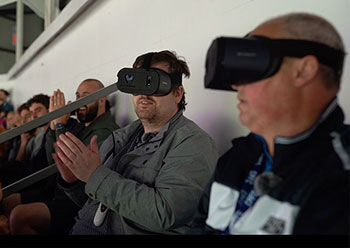University News Last updated 16 August 2023

Staff and students in the College of Computing supported assistive technology company GiveVision to test 5G tech aiming to make live events accessible for visually impaired people. The project was successfully trialled at The Championships at Wimbledon in July, enabling people with sight loss to watch the tournament like never before.
Founded in 2014, GiveVision aims to develop assistive technologies that can transform the lives of people with severe sight impairments. The company’s mission is to set a new accessibility standard for sports and entertainment, making it more inclusive for people with sight loss by breaking down barriers and enhancing their independence.
Testing at BCU
GiveVision visited BCU to develop its virtual reality (VR) headsets so it could run on a 5G network rather than Wi-Fi.
Senior Lecturer in Network and Cyber Security, and Project Lead at Cyber Physical Systems Research Group, Dr Raouf Abozariba led the BCU project with PhD student Ahmed Osman. The aim of the project team’s work was also to simulate the different connection to the 5G network, to make it ready for the tennis tournament trial.
Following extensive testing, GiveVision, in partnership with official Wimbledon connectivity partner Vodafone, trialled the headsets at Wimbledon.
This meant people with visual impairments were able to experience and watch matches in real time, experiencing the highs and lows of the match action. They could try out the GiveVision headsets, including using the camera on the headset to look around and take in the atmosphere. A second setting connecting to local TV cameras transmitted the broadcast to the headset, allowing users to track what was going on with the ball.
Raouf said: “The advantage of using 5G networks over Wi-Fi is low latency (latency is the delay in communication, which wireless systems typically endure due to contention and low signal quality, among other reasons) and higher availability in venues such as stadiums. GiveVision did not want to go to Wimbledon unprepared before testing their equipment on 5G networks. Wi-Fi networks are fundamentally different from cellular networks and come with high complexity in terms of networking and configurations.”
“Tears of joy”
Users described “tears of joy” on using the headsets, with some “endlessly grateful for the opportunity to see their favourite game… it was a dream to “see” Wimbledon came true!”
User Sinead Grealy said: “The technology is incredible. It takes my eyesight to better than it was. The first time I put it on I just went, ‘woah’. And then I went ‘woah’ again with the first adjustment because it’s so simple. I’m a technophobe and it’s so easy to use.”
Anita Deb, who also tested the headset, commented: “This is a life changing piece of tech that completely empowers visually-impaired people, not just for sport but in so many different applications. I think it puts visually-impaired people into a level playing field with other people inside of sport and I'm really grateful.”
Chief Technology Officer and Co-Founder of GiveVision Stan Karpenko said: “When we embarked on the Wimbledon project, we had literally no idea of how to make our system work over the New Radio. Having BCU on board was absolutely critical for us to get our technology operations ready for the event.”
“Without the support, access to equipment and expertise from the BCU 5G lab the Wimbledon pilot wouldn't have happened, and this is a fantastic example of the academic-SME collaboration to solve a real need.”
Impact of BCU collaborations
Pro Vice-Chancellor and Executive Dean of the Faculty of Computing, Engineering and the Built Environment Professor Hanifa Shah said: “At BCU we want to make a difference in society and ensure that our work has impact. To achieve this we prioritise working with businesses and helping them to build world-class technical capability and solutions through applying our advanced knowledge and expertise.
“We have been carefully cultivating and growing our expertise in niche areas such as 5G via investment in PhDs and supporting our staff to be actively involved in applied research. We are one of the few universities in the UK to have a full private 5G lab that has all the equipment and staff to take on challenging problems from industry and the public sector. This project is a fantastic example of the success of our approach, the quality of our collaborations with our partners and the impact that we are able to achieve.”
See the pilot in action
Watch a BBC video about the pilot and a video from Vodafone.
Raouf is in discussions to further develop the 5G headsets for use at future sporting events, namely the Olympics in Paris next summer. To find out more, contact Raouf.
Image credit: GiveVision